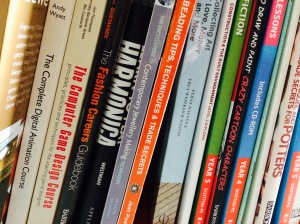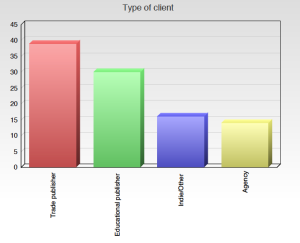 One piece of wisdom that is often repeated among freelance editors is that publishers don’t pay well, and the only way to make a good income is to graduate from publishing work and go after non-publishers.
One piece of wisdom that is often repeated among freelance editors is that publishers don’t pay well, and the only way to make a good income is to graduate from publishing work and go after non-publishers.
I think this is slightly simplistic, and it’s not always helpful. Partly I feel the need to argue against this view because much of my work is – unashamedly – with publishers. At the beginning of my freelance career, I worked almost exclusively with publishers. I felt precarious then (though not poor), because a lot of the work was for my most recent employer, and almost all the rest came from one other source picked up via an in-house contact. I still work occasionally for both clients, but these days I’ve diversified, work mainly with people I didn’t know before turning freelance, and for a range of trade and educational publishers as well as non-publishers.
What do I mean by ‘publisher’ and ‘non-publisher’? I include packagers and PM companies that produce books and similar material in the publisher definition, though I don’t work with many of either. By ‘non-publisher’ I mean independent authors, agencies dealing in written materials other than books, businesses, and so on. In 2016, the breakdown in terms of my hours was 68% publishers to 32% non-publishers (excluding time I spent mentoring for the SfEP).

When I came to work out the breakdown in terms of earnings, 70% of my earnings came from the publishing work, and 30% from the non-publishing work. This tells me several things:
- The average amount I was earning across the two sectors was very similar
- But, publishers were – on average – paying me slightly more
- There is scope for me to negotiate harder with non-publishers and market myself more or differently; the slightly lower earnings might reflect the fact that this is an area of work I am still developing
Do I want to abandon publishing work when I have spent nearly two decades learning how to do it? No. I continue to work in this sector partly because I enjoy it and it’s where I have most expertise, but mainly because it pays the mortgage (I am the main earner in our family). I know I am well paid for a freelance editor, despite my fondness for working with publishers, and I don’t work excessive hours to achieve this.
So is it fair to say that non-publishers pay better than publishers? Well, I think it depends, and my personal experience tells me it’s not necessarily the case, but I know it also depends on the sector within publishing. (I don’t do academic work.) It’s clear, too, that you do need to work to find the good clients in publishing – just as in non-publishing. And it is competitive – again, just as in non-publishing.
I know it’s possible to find extremely high-paying non-publishing clients, and I understand that for some of them, the sky is the limit – which cannot be said of publishers. But these rates are outliers, and there are outliers in the other direction too, and a lot more of them.
A final thought: don’t forget that many publishers are open to negotiation on rates, or will invite you to quote for a project. Sometimes you will have more grasp of the detail involved in a job than they do, and this can work in your favour as well as being helpful to them. And every time one of us has the discussion about rates for services with a publisher, even if we can’t effect a change on that occasion, we are continuing to keep the issue on the table, and incrementally we do make a difference.
 Liz Jones has worked as an editor in the publishing industry since 1998, and has been freelance since 2008. She works with a range of publishing and non-publishing clients.
Liz Jones has worked as an editor in the publishing industry since 1998, and has been freelance since 2008. She works with a range of publishing and non-publishing clients.
